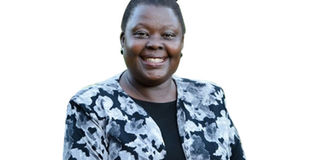My status, my inspiration

Lillian Kyomuhangi Mworeko’s HIV status inspired her career in social activism. Photo by Charlotte Ninsiima.
What you need to know:
THE RIGHT TO DANCE. At 29 years old, Lillian Kyomuhangi Mworeko discovered she was HIV-positive. The teacher turned social activist says her turning point was when a relative told her they needed to make plans because she would be dead soon. Decades later, Mworeko is not only alive but she is making great contributions in the fight against HIV/Aids, writes Charlotte Ninsiima.
Lillian Kyomuhangi Mworeko is a vibrant, warm and intelligent individual. She is also a very busy person with local and global commitments. Mworeko is the founder of the National Forum of PLHIV Networks in Uganda (NAFOPHANU), Together Against AIDS Positive Association (TAAPA) and the executive director the International Community of Women living with HIV Eastern Africa (ICWEA).
“Born in 1969 to Serapio Katungwesi and Beatrice Merabu Bakamwoga of Mukinga village, Sheema Municipality, Sheema District, Mworeko is the first born of six siblings. She was also the first student to attain a first grade at Mukinga Primary School, which won her a place at Maryhill High School where she attended both O and A-Level education.
Declared HIV-Positive
At 29 years old, she learnt that she was HIV-positive.
“Ordinarily I would have been shocked but I was dealing with bigger issues than my health, so at that time it did not occur to me that my life was at stake,” Mworeko reveals. Even as insulated as she was from the reality of living with HIV, she experienced stigma from relatives that forced her to fight back.
“Once while chatting with a relative, they told me that I needed to start putting my issues in order in preparation of my impending death. I was so shocked and I believe that that statement is what has kept me going till now. I immediately made a resolution that I was going to stand the test of time which I’m glad to say I have,” Mworeko recounts.
She began her fight by looking for supportive people and communities.
“I have been a strong woman throughout this trying journey and it goes without mentioning that it has been far from easy. Fortunately, I surrounded myself with people that were supportive such as Major Ruranga, Milly Katana and Canon Gideon, all of who encouraged and strengthened me from the very start,” she notes.
Taking a stand
Realising how much damage stigma could affect people, she decided to come open about her status. This had the effect of disarming people who instead of discriminating against her treated her with empathy and compassion.
“I remember during my class at Makerere University, I would even sensitise fellow classmates and some lecturers gave me ample time to talk about HIV to students before lectures,” she relates of her journey to activism.
She later joined the National Guidance of People living with HIV (NGEN+), and started going to various districts to form district networks and engage in sensitisation and education programmes.
“This decision was a game changer. I transformed myself from victim to victor. It was an empowering transformation,” the activist says.
Right medication
She started medication around 2003, and was on the first line regimen and in that combination, efevirenz was added. In 2006, she was pregnant with the first child, hence the combination was changed to nevirapine. She remembers the challenges she encountered as doctors tried to find a medical combination for her CD4 count.
“It was a discouraging experience. To begin with, I reacted badly because my CD 4 count was really high to be started on nevirapine, so I tried to negotiate with my doctor but he insisted.” All this happened while she was away in Argentina on a business trip. She called him immediately and he told her to stop the medication. However, on her return back to Uganda she decided to start on caletra.
Having found the perfect drug combination, Mworeko decided to take it faithfully. She says: “ Adherence is key and my viral load has been undetectable for quite a number of years just because I take adherence seriously.”
Accomplishments
Mworeko believes she has been able to live her life to its fullest, because she is not any different from one who is HIV-negative. “I got to know my status, accepted it, appreciated it and decided HIV will not define me, rather I will define it,” she asserts. Turning around the tables, she has been able to achieve what naysayers though she would not live long enough to.
“I am happily married to Isreali Kafengye with whom I have five healthy children. I hold leadership positions both locally and globally, such as a seat on the community rights and gender working group for Global Fund and also Global Validation Advisory Committee for Elimination of HIV transmission from mother to child (EMTCT) and syphilis under the WHO,” she proudly reveals.
Furthermore, she has advocated for Uganda Aids Commission to consider gender seriously and as a result, a gender technical working team was put in place along with a gender officer. She has helped contribute to the HIV response nationally, regionally and globally. At the national level she has contributed to formation of organisations and networks notably, the Uganda Network of Service Organisation (UNASO). She has challenged discrimination on the basis of status, for example, she was among the taskforce that challenged HIV related travel restrictions under the leadership of UNAIDS and during her time, she and her colleagues were able to have USA and China lift the ban on travel restrictions.
EMPOWERMENT
Mworeko has been instrumental in empowering women and girls, fighting for the rights of PLHIV for example to ensure easy access to treatment care and prevention services.




